Mindy Yocom: Water Rat
With a degree in journalism from Shippensburg University and a career spent backstage in the theatre, how did Mindy become the assistant aquatics director at the Hempfield recCenter?
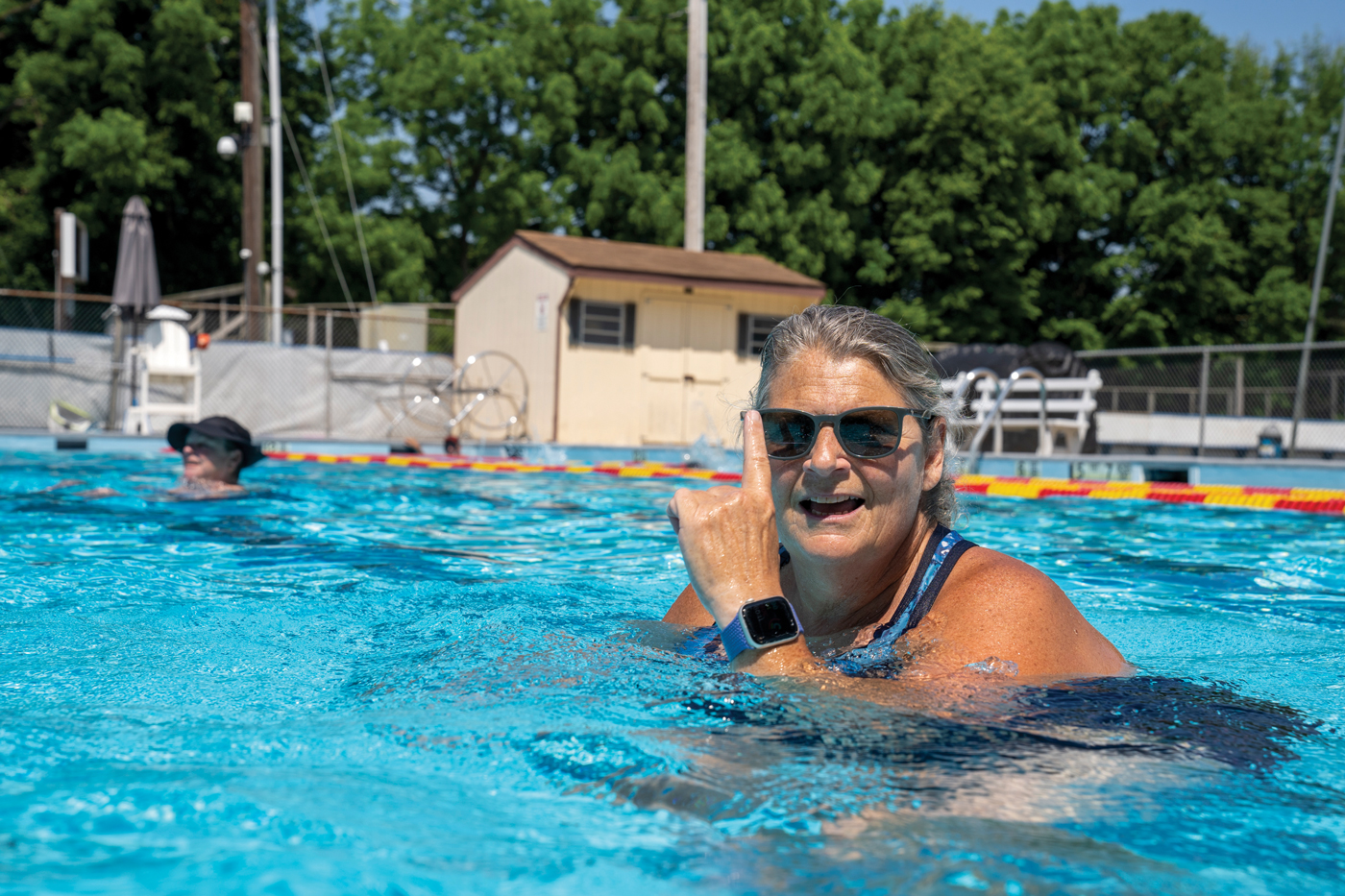
Mindy Yocom leads a morning water-aerobics class at East Petersburg Community Pool, which is managed by the Hempfield recCenter.
Moving from New York to Washington Boro in the summer of 1972 may have played a role. In New York, Mindy and her sisters rode their bikes everywhere, including to the public pools in the area. But, Washington Boro was vastly different. “We were left to our own devices,” she says of her parents heading off to their new jobs that summer. “That’s when we discovered the river. Nobody told us we shouldn’t swim in that water,” she says, referencing a time when the Susquehanna’s water quality was less than pristine. “So, I guess you can say I’m more of a river rat.” The river soon proved to be alluring in another way – Mindy became an avid kayaker.
Years later, kayaking would inspire an idea. Musical acts visiting the American Music Theatre (AMT), where Mindy worked as a lighting operator, often asked for ideas on how they could relax and unwind. Mindy proposed that she could take guests kayaking. (One group that took her up on the offer was Billy Ray Cyrus’ backup band.) The success of the venture prompted her desire to become a certified lifeguard. Mindy enrolled in classes offered by Manheim Township and dove in. “I’m the oldest in the class,” she says of being 46 years old at the time, “and I fail the swimming test!”
Fortunately, her instructor, Katie Smith, saw something special in Mindy and offered to privately work with her in order to improve her swimming skills. So, Mindy concurrently – and successfully – learned to swim better and worked to become a certified lifeguard. “My first job was at Golden Meadows,” she recalls. “I guarded the pool when LAC [Lancaster Aquatic Club] held their morning practices there during the week. I’d leave AMT around 11 p.m. and have to be at Golden Meadows by 5 a.m.”
The Golden Meadows stint led to other opportunities. At many pools, lifeguards are recruited to teach water-aerobics classes and Mindy developed her own brand of classes that entail exercise mixed with storytelling. “I taught for Manheim Township for years, plus a few other places,” she says. When she became employed by Hempfield recCenter, they requested exclusivity to her time and talents.
Mindy is a firm believer in the power of water. When she began to experience ailments associated with the physical demands of her theatre job, water workouts kept the inevitable – finding a new career – at bay. When she underwent knee-replacement in November 2018, she was back to exercising in the water by January. “You have to keep moving,” she says of battling the aging process. “Water exercise can be a lifetime endeavor,” she continues, pointing to the wide range of age groups that take the classes that are taught by herself and nine other instructors at Hempfield.
As many have discovered, working out in the water is good for the mind and body. The simple act of floating is a mindful exercise that disconnects you from noise and stress. As for the physical aspects, Mindy notes that while water provides a cushioned environment that is kind to compromised joints, it also allows for aerobic and strength-training exercises that benefit the cardiovascular and muscular systems in our bodies. “It’s not your mother’s exercise routine anymore,” she says of the early days of water exercise, when equipment consisted of milk containers filled with water to provide resistance.
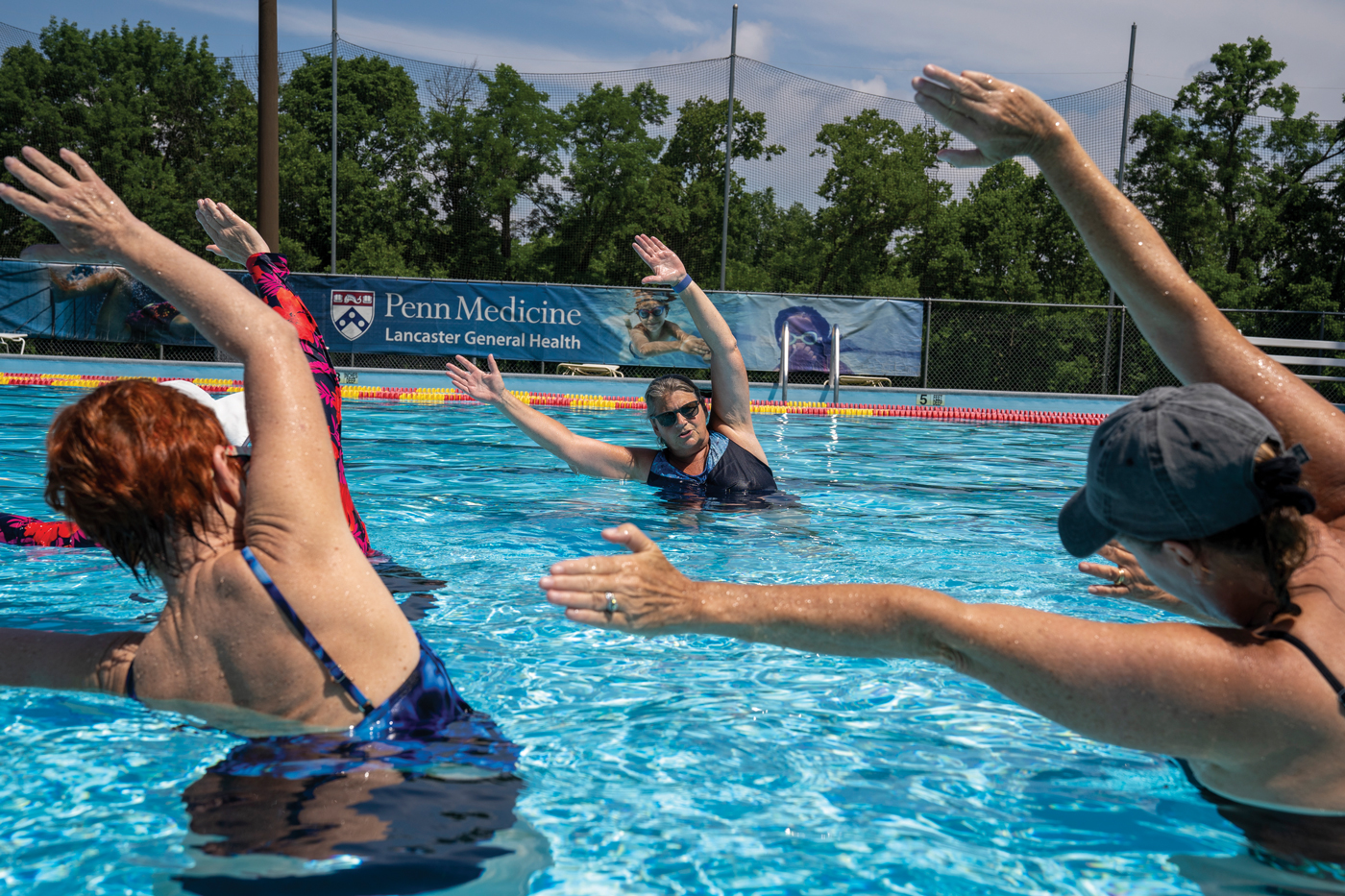
“It’s not your mother’s exercise routine anymore,” Mindy says of shallow- and deep-water classes that benefit the muscular and cardiovascular systems and improve core strength.
Today, water classes utilize barbells, noodles and other devices that help to improve muscle and core strength (which lessens the chances of falling for older adults) and extend to spinning courtesy of water bikes and balancing classes that entail paddle boards. Classes also take their inspiration from Pilates, barre and the martial arts.
The fact that swimming is a lifetime endeavor is evidenced by the fact that lanes for lap swimmers (and water runners) always seem to be at a premium. (At Hempfield, the indoor pool opens weekdays at 5 a.m. for lap swimming and people are usually waiting at the door.)
Fortunately, Mindy had a full-time job waiting for her at Hempfield recCenter when, after 14 years, she left AMT. Her duties increased to include teaching swimming lessons, overseeing the lifeguard certification program and managing the East Petersburg Community Pool, where she teaches classes, provides swimming lessons, oversees the lifeguards and coordinates community events during the summer months. National Night Out (August 2 this year) is always a highly anticipated event at the pool, as first responders are always a part of the festivities.
Mindy has become passionate about teaching people to swim. “Learning to swim is crucial,” she says. “It’s a life skill that everyone should learn. It breaks my heart to hear the stories that surround drownings.” Mindy shares that last summer, her lessons roster included six adults. “That’s the most adults I’ve ever taught in one year,” she shares, noting that many told her that learning to swim is an item they’ve always wanted to eliminate from their bucket lists.
Mindy’s outside interests are also water-oriented. She continues to kayak, with the Susquehanna being her favorite local destination. She also loves to kayak in the ocean. She became an avid shell collector years ago, naming the Outer Banks as her favorite place to go shelling. This spring, she ventured a little farther south and explored the deserted islands that comprise Cape Lookout National Seashore (North Carolina) and came home with a treasure trove of shells. When storms troll the Eastern Seaboard, Mindy is known to jump in the car and head for Cape Henlopen in Delaware to search for shells. “Shelling is always best after a storm,” she says. She has turned her hobby into an enterprise she calls My Rustic Art. If you’re looking for anything made from seashells, check out her work at myrusticart.com.
The Dilemma: Finding Lessons
If you’re a parent seeking swimming lessons for your children, no doubt you’ve encountered the phenomenon that is sweeping America this summer … there’s no room at the pool!
As an Aquatots (children ages 6 months-plus) session was wrapping up at Hempfield on a Saturday morning in April, the instructor announced that if parents wanted to proceed with the next session, they needed to sign up ASAP. It wasn’t some sort of come-on to guarantee a full class – the fact was, plenty of potential students were waiting in the wings for a coveted spot.
Just like other supply-chain situations affecting life in America, the availability of swimming lessons is in dire straits due to a tsunami effect of sorts: many pools curtailed lessons over the past two years and are now dealing with a backlog of kids wanting swimming lessons. The fact that there is an on-going lifeguard shortage (lifeguards typically assist with classes) only adds to the issue. A spokesperson for a pool in Chicago told the Today show that even if they could offer lessons on a 24/7 basis, the backlog would persist. A pool manager in Greensboro, North Carolina, reported that not a day goes by that she doesn’t have to field hundreds of messages from parents seeking lessons for their children. Pools across the country are echoing that sentiment. Many are sounding the alarm that an entire generation of children will not be proficient in the water. Search lessons locally and the disclaimers “wait listed” and “sold out” appear on websites.
With the summer season being a “washout,” what’s a parent to do? Now’s the time to start perusing the websites of rec centers with indoor pools for sessions that are offered in the fall and winter seasons.
As Mindy Yocom points out, learning to swim is a vital life skill. According to statistics compiled by the YMCA, nine out of 10 parents view swimming as an important life skill. That viewpoint may be influenced by the fact that 24% of parents report feelings of inadequacy when they are in the water and therefore they want their children to feel more confident when they go swimming. (At East Petersburg, children must pass a test that entails swimming 25 meters without stopping in order to be in the pool without a parent or guardian.)
The statistics that point to why swimming lessons are important are sobering. The Centers for Disease Control (CDC) reports that drowning is the leading cause of death for children in the United States. On average, 11 children die from drowning each day. That’s nearly 4,000 per year. (Children ages 1-4 have the highest drowning rates, with most occurring in pools.) More alarming is the fact that another 22 children (per day) will experience non-fatal accidents involving water, with the outcomes ranging from no injuries to catastrophic impairment/disability. The American Academy of Pediatrics now recommends that children begin taking swimming lessons at age 1.
Olympic skier Bode Miller and his wife, Morgan (Beck), who is a beach-volleyball player, humanize those statistics. In 2018 their 19-month-old daughter, Emeline, drowned. Morgan and Emeline were visiting with neighbors, when Morgan suddenly noticed the toddler was no longer in the room. Somehow Emeline had slipped outside. Morgan found her in the pool. Despite receiving CPR and medical attention at a hospital, Emeline died a day later.
Today, the Millers are advocates for Infant Swimming Resource (ISR), whose instructors teach babies as young as 6 months techniques that enable them to help save themselves in the water. The youngest students learn how to roll over on their backs should they find themselves in trouble in the water. Older students (up to 6 years) are taught to combine rolling over with swimming in order to reach safety. The Millers’ twin sons, who were born in late 2019, began ISR lessons at 7 months of age. In this area, ISR instructors include Michelle Benko (ISR of Central PA) and Jennifer Witmer (ISR Lancaster). Instructors are also located in the Hershey and York areas. For more information, visit infantswim.com.
The statistics are worse for minority children. Olympic gold medalist, Cullen Jones, who is the hands-on spokesperson for USA Swimming’s learn-to-swim initiative, Make a Splash, estimates that 70% of Black children cannot swim. His own near-drowning experience fuels his passion for teaching kids to swim. As a 5 year old, Jones was visiting Dorney Park in Allentown, and after coming down a water slide, became separated from his flotation device, as well as his father. He could not swim. To this day, he remembers the panic of not being able to breathe. Thirty seconds of being underwater caused him to lose consciousness. (A child can drown in as little as 20 seconds.) Lifeguards on duty provided CPR and revived him.
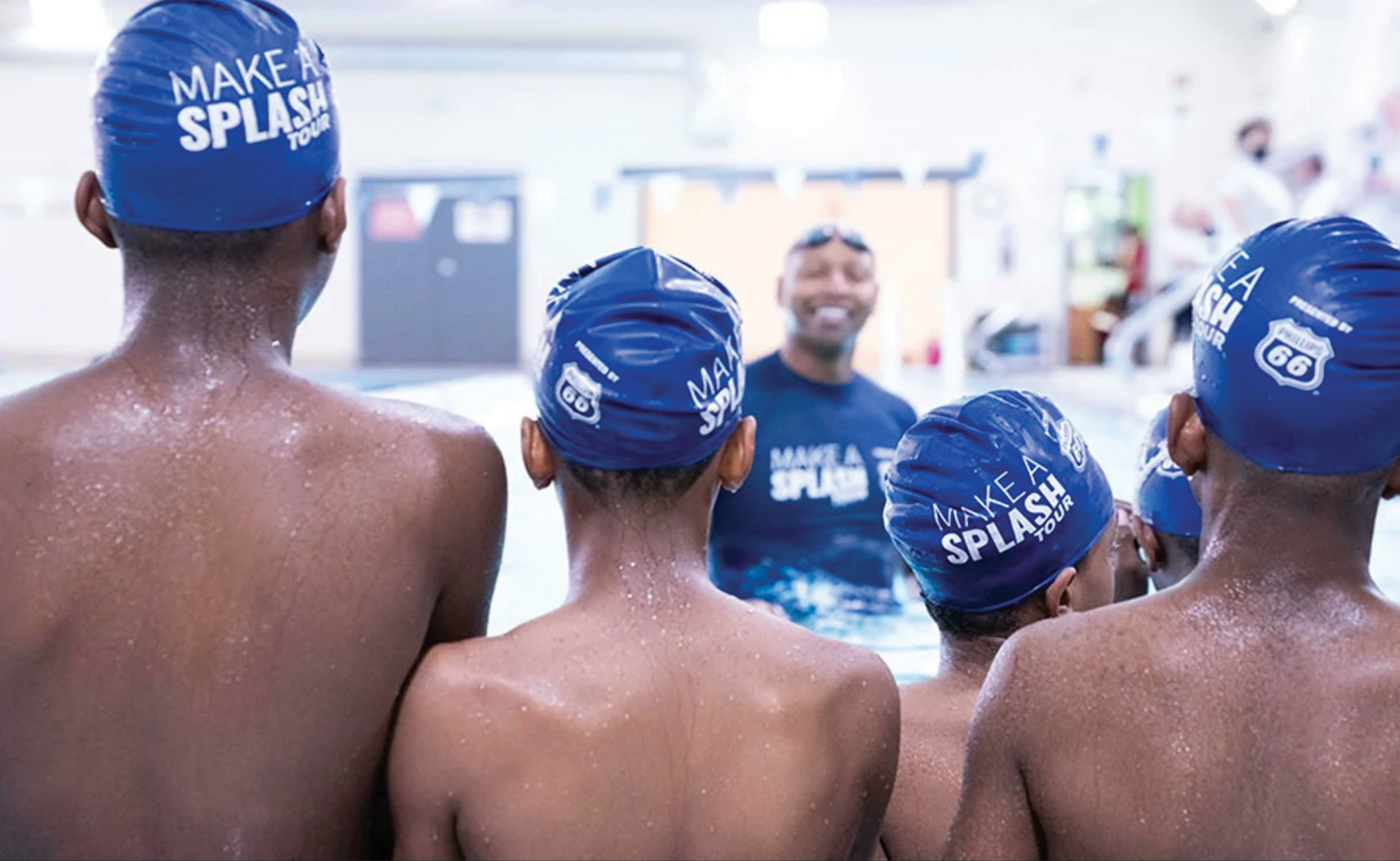
Olympic gold medalist, Cullen Jones, is the hands-on spokesperson for USA Swimming’s learn-to-swim program, Make a Splash. In the aftermath of George Floyd’s death, Jones made it a goal to bring the program to underserved inner-city neighborhoods. USA Swimming photo.
Upon returning home to Texas, his parents signed him up for lessons and the rest is history – he became the second Black swimmer to win an Olympic gold medal (actually he has two, from 2008 and 2012) and was the first to set a world record. He spent part of the pandemic returning that favor, as he taught his mother to swim. His own son began taking lessons at age 2.
The events surrounding George Floyd’s death inspired Jones to make a bigger impact with Make a Splash. With the backing of USA Swimming, Jones is taking the program into underserved inner-city neighborhoods where swimming lessons are rarely offered.
This year, the annual Make a Splash Tour, which is sponsored by Phillips 66, featured Jones and other Olympic ambassadors, including Rowdy Gaines, Missy Franklin, Elizabeth Beisel and Nathan Adrian. Their first stop (May 9-10) took them to Philadelphia, where they worked with children at the West Philadelphia YMCA and the Salvation Army KROC Center. For more information, visit USAswimming.org/makeasplash.
Local Year-round Sources for Swimming Lessons/Exercise Classes
Ephrata Recreation Center, ephratarec.com
Greater Elizabethtown Area Recreation & Community Services, getintogears.org
Hempfield recCenter, hempfieldrec.com
LA Fitness, lafitness.com (exercise only)
Lititz recCenter, lititzrec.com
Manheim Township Parks & Recreation, manheimtownship.org
Universal Athletic Club, universalathleticclub.com
YMCA of the Roses, rosesymca.org
Staying Safe in the Water
Even if lifeguards are present, there are things you can do to ensure a safe and enjoyable day by the water.
1. Put the phone or book down and keep an eye on your children.
2. If you lack confidence in the water, swim in close proximity to a lifeguard.
3. Download apps that report beach conditions. If rip tides or high surf are predicted, stay out of the water.
4. If you are in or on any kind of watercraft, wear a life vest. It only takes 60 seconds for an adult to drown.
5. If you’ve been drinking alcohol, stay out of the water.

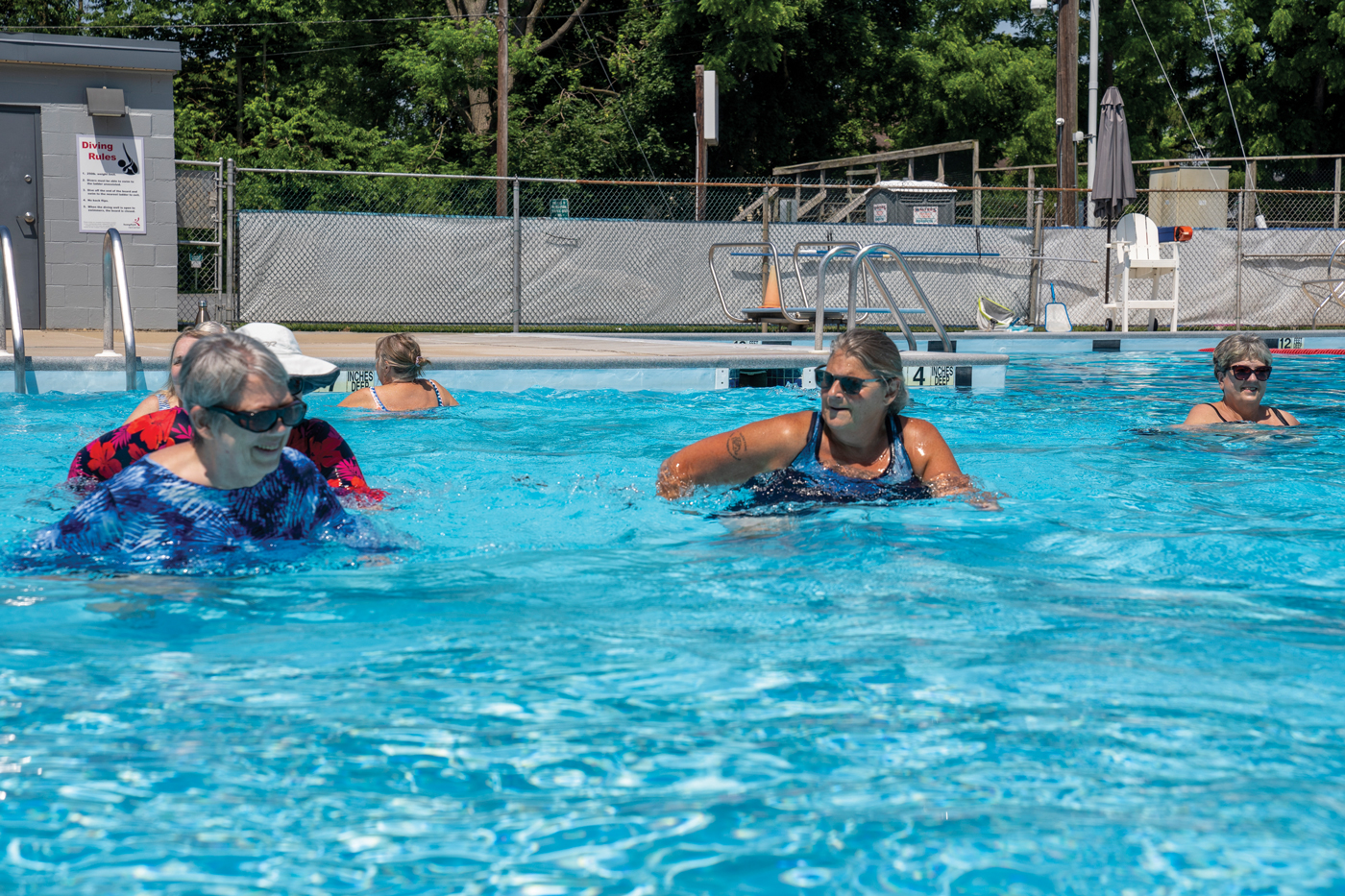
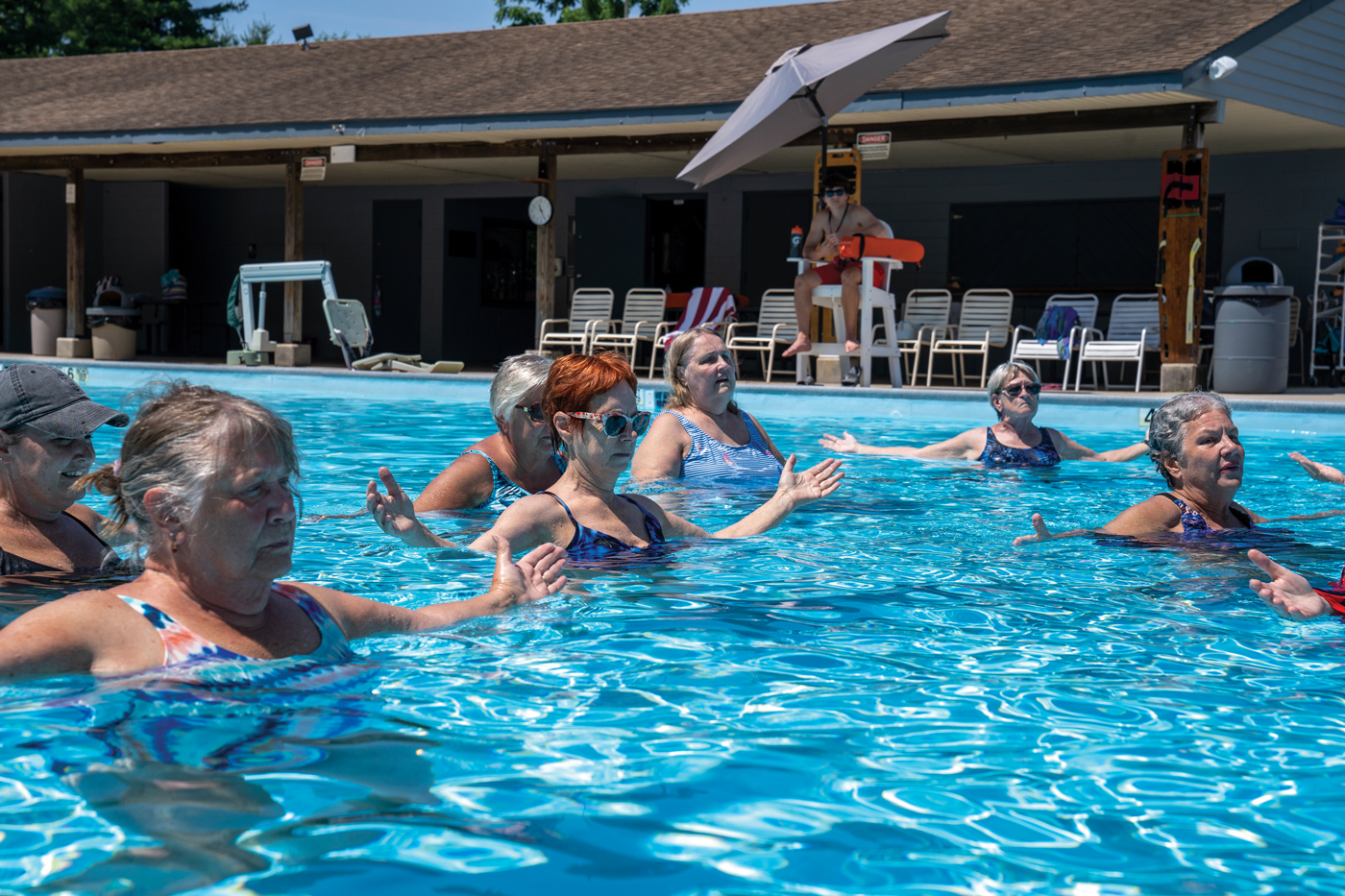
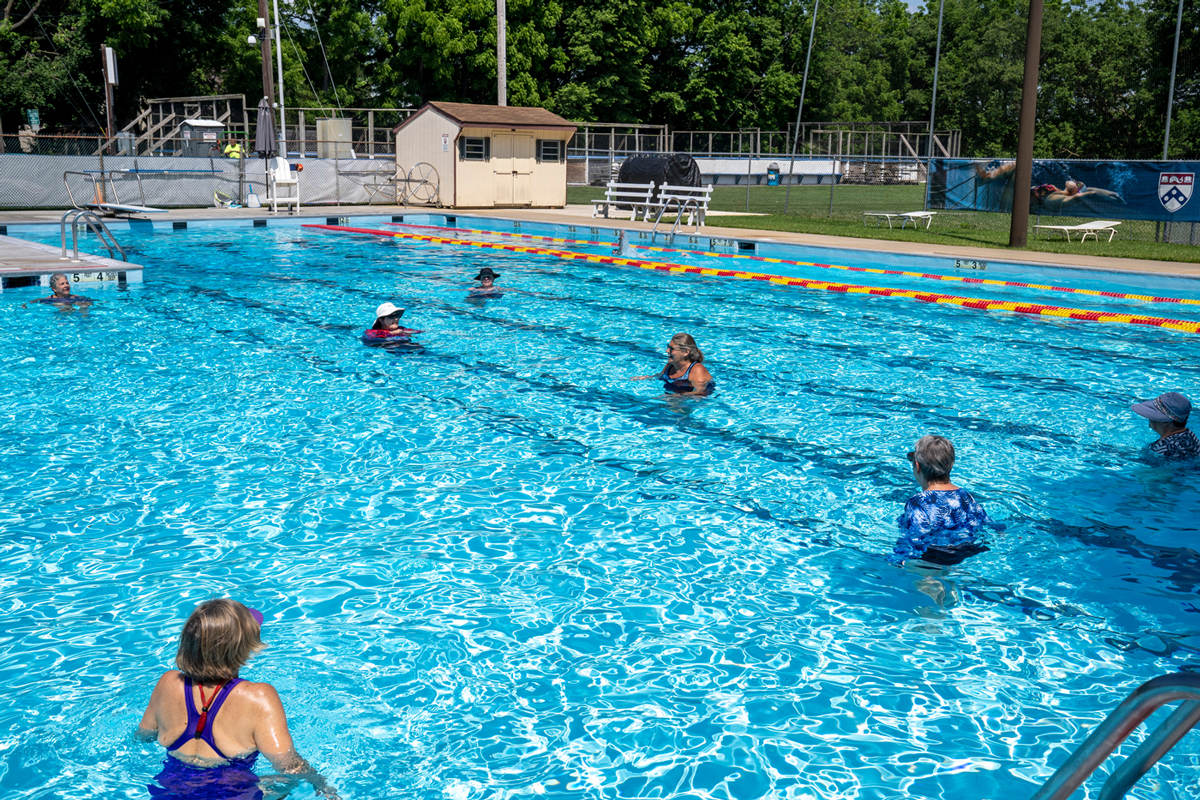
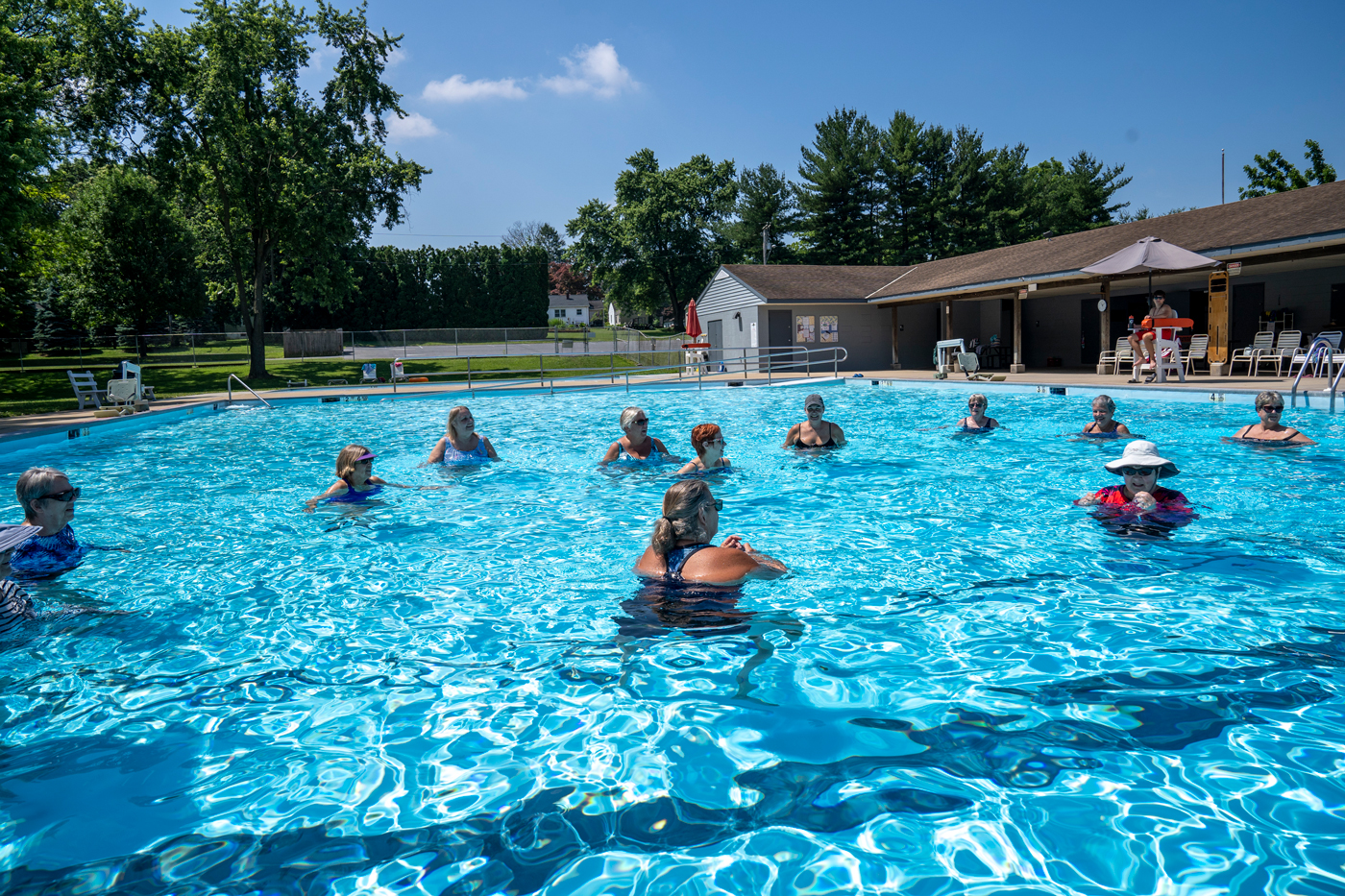
I have been a member of HARC for 10-years and swim daily at either the HARC indoor pool or the East Pete outdoor pool and I daily see the commitment and inspiration that Mindy Yocum brings to her work. Most importantly she does it with a great spirit of frivolity and makes the activities a fun-filled time, which in turn helps to eliminate the trepidation that newcomers experience